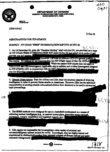Chilling effect
In a legal context, a chilling effect is the inhibition or discouragement of the legitimate exercise of natural and legal rights by the threat of legal sanction.[1] The right that is most often described as being suppressed by a chilling effect is the US constitutional right to free speech. A chilling effect may be caused by legal actions such as the passing of a law, the decision of a court, or the threat of a lawsuit; any legal action that would cause people to hesitate to exercise a legitimate right (freedom of speech or otherwise) for fear of legal repercussions. When that fear is brought about by the threat of a libel lawsuit, it is called libel chill.[2] A lawsuit initiated specifically for the purpose of creating a chilling effect may be called a Strategic Lawsuit Against Public Participation ("SLAPP").
| Part of a series on |
| Censorship by country |
|---|
 |
| Countries |
| See also |
"Chilling" in this context normally implies an undesirable slowing. Outside the legal context in common usage; any coercion or threat of coercion (or other unpleasantries) can have a chilling effect on a group of people regarding a specific behavior, and often can be statistically measured or be plainly observed. For example, the news headline "Flood insurance [price] spikes have chilling effect on some home sales,"[3] and the abstract title of a two‐part survey of 160 college students involved in dating relationships: "The chilling effect of aggressive potential on the expression of complaints in intimate relationships."[4]
Usage
In United States and Canadian law, the term chilling effects refers to the stifling effect that vague or excessively broad laws may have on legitimate speech activity.[5]
However, the term is also now commonly used outside American legal jargon, such as the chilling effects of high prices[3] or of corrupt police, or of "anticipated aggressive repercussions" (in say, personal relationships[4]).
A chilling effect is an effect that reduces, suppresses, discourages, delays, or otherwise retards reporting concerns of any kind.
An example of the "chilling effect" in Canadian case law can be found in Iorfida v. MacIntyre where the constitutionality of a criminal law prohibiting the publication of literature depicting illicit drug use was challenged. The court found that the law had a "chilling effect" on legitimate forms of expression and could stifle political debate on issues such as the legalization of marijuana.[6] The court noted that it did not adopt the same "chilling effect" analysis used in American law but considered the chilling effect of the law as a part of its own analysis.[7]
History
In 1644 John Milton expressed the chilling effect of censorship in Areopagitica:
For to distrust the judgement and the honesty of one who hath but a common repute in learning and never yet offended, as not to count him fit to print his mind without a tutor or examiner, lest he should drop a schism or something of corruption, is the greatest displeasure and indignity to a free and knowing spirit that can be put upon him.[8]
The term chilling effect has been in use in the United States since as early as 1950.[9] The United States Supreme Court first refers to the "chilling effect" in the context of the United States Constitution in Wieman v. Updegraff in 1952.[10]
It, however, became further used as a legal term when William J. Brennan, a justice of the United States Supreme Court, used it in a judicial decision (Lamont v. Postmaster General) which overturned a law requiring a postal patron receiving "communist political propaganda"[11] to specifically authorize the delivery.[12]
The Lamont case, however, did not center around a law that explicitly stifles free speech. The "chilling effect" referred to at the time was a "deterrent effect" on freedom of expression—even when there is no law explicitly prohibiting it. However, in general, "chilling effect" is now often used in reference to laws or actions that do not explicitly prohibit legitimate speech, but that impose undue burdens.[12]
Chilling effects on Wikipedia users
Edward Snowden disclosed in 2013 that the US government's Upstream program was collecting data on people reading Wikipedia articles. This revelation had significant impact the self-censorship of the readers, as shown by the fact that there were substantially fewer views for articles related to terrorism and security.[13] The court case Wikimedia Foundation v. NSA has since followed.
See also
References
- chilling effect. (n.d.). Retrieved October 19, 2011, from http://law.yourdictionary.com/chilling-effect
- Green, Allen (October 15, 2009). "Banish the libel chill". The Guardian.
- "Flood insurance spikes have chilling effect on some home sales". WWL‑TV Eyewitness News. October 15, 2013. Archived from the original on November 19, 2013.
Realtors say [price spikes are] already causing home sales to fall through when buyers realize they can't afford the flood insurance.
- Cloven, Denise H.; Roloff, Michael E. (1993). "The Chilling Effect of Aggressive Potential on The Expression of Complaints in Intimate Relationships". Communication Monographs. 60 (3): 199–219. doi:10.1080/03637759309376309.
A two‐part survey of 160 college students involved in dating relationships.... This chilling effect was greater when individuals who generally feared conflict anticipated aggressive repercussions (p < .001), and when people anticipated symbolic aggression from relationally independent partners (p < .05).
- "censorship-reports-striking-a-balance-hate-speech-freedom-of-expression-and-nondiscrimination-1992-431-pp". Human Rights Documents online. Retrieved May 29, 2020.
- Iorfida v. MacIntyre, 1994 CanLII 7341 (ON SC)at para. 20, <"Archived copy". Archived from the original on July 13, 2012. Retrieved October 25, 2011.CS1 maint: archived copy as title (link)> retrieved on 2011-10-25
- Iorfida v. MacIntyre, 1994 CanLII 7341 (ON SC) at para. 37, <"Archived copy". Archived from the original on July 13, 2012. Retrieved October 25, 2011.CS1 maint: archived copy as title (link)> retrieved on 2011-10-25
- John Milton (1644) Areopagitica, edited by George H. Sabine (1951), page 29, Appleton-Century-Crofts
- Freund, Paul A. "4 Vanderbilt Law Review 533, at 539 (1950–1951): The Supreme Court and Civil Liberties".
- "The Chilling Effect in Constitutional Law". Columbia Law Review. 69 (5): 808–842. May 1969. doi:10.2307/1121147. JSTOR 1121147.
- Safire, William (July 20, 2005). "Safire Urges Federal Journalist Shield Law". Center For Individual Freedom. Retrieved June 18, 2008.
Justice Brennan reported having written a 1965 decision striking down a state's intrusion on civil liberty because of its "chilling effect upon the exercise of First Amendment rights...”
- "LAMONT V. POSTMASTER GENERAL, 381 U. S. 301 (1965)". Justia. Retrieved June 18, 2008.
- Penney, Jonathon W. (2016). "Chilling Effects: Online Surveillance and Wikipedia Use". Berkeley Technology Law Journal. doi:10.15779/z38ss13. Retrieved August 20, 2019.
External links
- Lumen, containing many current examples of alleged chilling effects
- Terms associated with libel cases
- Cato Policy Analysis No. 270 Chilling The Internet? Lessons from FCC Regulation of Radio Broadcasting
- Libel Reform Campaign The Chilling Effect of English libel law
